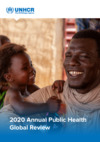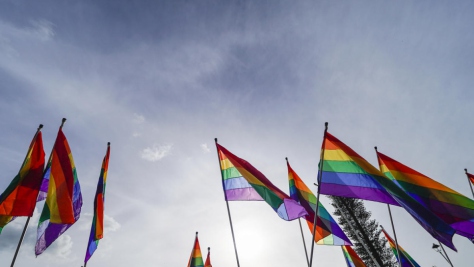Men, women and children suffering from harsh physical conditions and legal shortcomings at Pacific Island asylum centres: UNHCR reports
This is a summary of what was said by UNHCR spokesperson Adrian Edwards – to whom quoted text may be attributed – at today's press briefing at the Palais des Nations in Geneva.
In two reports released today, UNHCR finds that asylum-seekers transferred from Australia to processing centres at Nauru and Manus Island in Papua New Guinea (PNG) are living in arbitrary detention in conditions that do not meet international standards of treatment.
UNHCR understands Australia's determination to respond robustly to the challenges of people smuggling and to dissuade people from undertaking dangerous irregular travel by sea. However we believe those responses must not neglect the compelling protection needs, safety and dignity of the individuals affected.
These reports are also in the context of what UNHCR has observed to be a sharp deterioration during 2013 in the overall quality of protection and support available to asylum-seekers and refugees who come to Australia by boat. It remains the case that when policies and practices are based primarily on deterrence, they can have harmful and, at times, punishing consequences for people affected, particularly families and children.
The reports identify troubling shortcomings at both centres, and urge all three States involved to consider the findings and recommendations and act upon them.
In both Nauru and PNG the current policies, operational approaches and harsh physical conditions at the centres not only do not meet international standards - they also have a profound impact on the men, women and children housed there.
UNHCR is concerned that they constitute mandatory detention which is not compatible with international law. We are also worried that they do not provide a fair and efficient system for assessing refugee claims, do not provide safe and humane conditions of treatment in detention, and do not provide for adequate and timely solutions for recognized refugees.
With the Nauru report, it acknowledges some positive developments since our last visit in March. However, there have also been significant setbacks in refugee processing, and a deterioration in reception conditions. Despite a processing system being in place under Nauru law, only one decision has been handed down in the 14 months since the centre reopened.
No decisions at all have been finalized at the centre in PNG, and while some improvements were observed since UNHCR's last inspection in June, the physical conditions within detention, together with the slowness of processing and the lack of clarity regarding safe and sustainable solutions for refugees were likely, together, to have a serious and negative effect on the health and welfare of people transferred from Australia.
At both centres, the psycho-social well-being of vulnerable people - including survivors of torture and trauma and unaccompanied children - is an issue of concern. UNHCR also called on all three States not to transfer children, particularly those who are unaccompanied, unless and until there has been a marked improvement in conditions in both centres.
UNHCR is particularly concerned by the impact of policies that will prevent recognized refugees from finding safe, dignified and sustainable solutions in the medium to long term. The prospect for refugees in PNG finding permanent protection there presents formidable challenges, and it is clear that Nauru will offer only very limited opportunities for refugees even in the shorter term.
UNHCR believes the arrangements at Nauru and PNG would benefit from a much clearer articulation of the policy and operational framework that would set out how, when and where refugees will be able to secure protection and exercise the rights required under the 1951 Refugee Convention.
The full reports, including recommendations, are available at: www.unhcr.org.au
For more information on this topic, please contact:
- In Canberra (Regional): Ben Farrell on mobile +61 407 971 686
- In Geneva: Adrian Edwards on mobile +41 79 557 91 20
- Babar Baloch on mobile +41 79 557 9106
Related news and stories
Global photo project shows power of football during displacement
The Kenyan powerhouse improving women's lives in Australia
UN refugee chief welcomes cities' support for refugees
UNHCR appeals to Australia to act and save lives at immediate risk
UNHCR urges Australia to end separation of refugee families
'We must believe we can make a difference and we can do things better' - Andrew Harper
-

Six athletes to make up Refugee Paralympic Team at Tokyo Games
30 Jun 2021 Competitors in four sports – including first female refugee Paralympian – ready to take to world stage after beating the odds despite being forced to flee their homes. -

'We are the lucky ones'
30 Jun 2021 Ethiopian refugee Mihret hid in the bush for days without food or water, to escape the Tigray conflict. Now safe in Sudan, she is using her engineering skills to assist her community. -

2020 Annual Public Health Global Review
30 Jun 2021 UNHCR aims to ensure healthy lives and promote wellbeing of its persons of concern, enabling them to access safe, effective, equitable and affordable health care services. -

News Comment by UNHCR EU Representative on launch of Slovenian Presidency of the European Union
30 Jun 2021 This news comment is attributable to Gonzalo Vargas Llosa, UNHCR Representative to the EU, Belgium, Ireland, Luxembourg, and the Netherlands -

IPC announces six athletes to compete for the Refugee Paralympic Team at the Tokyo 2020 Paralympic Games
30 Jun 2021 Joint IPC/UNHCR Press Release -

Responding to the health and protection needs of people selling or exchanging sex in humanitarian settings
30 Jun 2021 This joined UNHCR and UNFPA guidance proposes actions for responding to the health and protection needs of people who sell or exchange sex in humanitarian settings. It covers different settings (e.g. in acute emergencies or during periods of transition or stabilization or protracted displacements; in or out of camp), and different population groups affected by humanitarian crises and highlights alignment with broader human rights frameworks for responding to the health and protection needs of people who sell or exchange sex. -

Global Roundtable charts joint action for protection of forcibly displaced LGBTIQ+ people
29 Jun 2021 Joint Press Release by UNHCR and UN Independent Expert on Protection Against Violence and Discrimination Based on Sexual Orientation and Gender Identity -

Tip sheet on applying the UNHCR age, gender and diversity policy to children
29 Jun 2021 -

Tip sheet on applying the UNHCR age, gender and diversity policy to older people
29 Jun 2021
